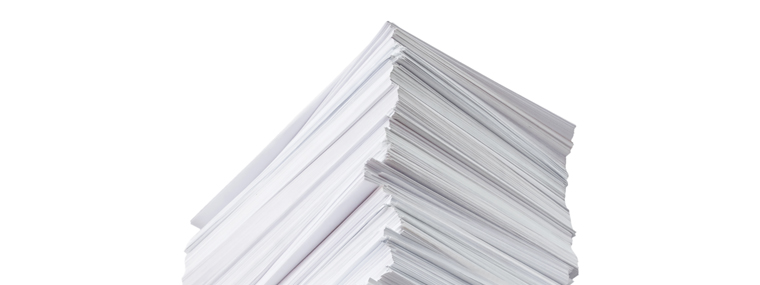
Records—Save Them, Protect Them…They Could Save Your Business a Bundle
By Mark E. Battersby / Published February 2020

As the owners and managers of many pressure washing businesses begin the onerous tax preparation process, they’re once again discovering just how important good records are for tax savings. Good records can help every pressure washer business generate an accurate tax bill and ward off zealous IRS auditors, but that’s not all.
Good records are also invaluable for monitoring the progress of the pressure cleaning operation or when preparing financial statements required by lenders and investors, rewarding when trying to sell the business, and particularly helpful for securing financing, not to mention how useful those records can be when facing any government audit.
In reality, most pressure cleaning business owners neglect the recordkeeping aspect of their operation either because of a lack of time or uncertainty about what is required and which records may be important.
The Basics
Having a clearly defined document retention policy has several benefits: efficiency, safety, and peace of mind. First, with a good document retention strategy, managing records and locating documents when they are needed is easier.
That same document retention policy can ensure that the pressure washing operation complies with all state and federal recordkeeping requirements. After all, there are numerous laws and regulations, including the IRS’s tax audit regulations, employment tax laws such as the Fair Labor Standards Act (FSLA), the Health Insurance Portability and Accountability Act (HIPPA), the Employee Retirement and Income Security Act (ERISA), as well as mandates by the Occupational Safety and Health Administration (OSHA). And, don’t forget the many state and local document retention requirements along with those increasingly more complex sales tax records.
Keeping Records
Accurate recordkeeping is essential to many aspects of a successful pressure cleaning business—from assessing the operation’s profit margins to ensuring compliance with the ever-increasing number of state and federal rules.
Among the records that it’s important to keep are the following:
• Hiring records for at least a year.
• Payroll records for three years. However, with employees able to file law- suits for unpaid backpay or overtime, a five-year retention period might be best.
• I-9 forms, required to show an employee is eligible to work in the U.S., should, by law, be kept for three years after hiring or one year after terminating a worker.
• Separation paperwork for five years after termination.
• Family Medical Leave Act reports for three years after termination.
• Retirement benefits forms for six years
• Drug test records for five years
• Employee health and safety records for five years.
• The Occupational Safety and Health Act requires records be kept and retained for any employee injuries and illnesses obtained in the workplace, with a brief description and any other pertinent information.
• Unemployment Insurance Information for up to seven years.
Taxing Tax Records
The IRS does not require a business to keep records in any one manner. Federal income tax laws require only that every business keep “complete and accurate records.” Although what records a pressure washing business needs to keep and for how long is unclear, the requirement is fulfilled as long as the records produce an accurate accounting of income and expenses.
To help prepare future or amended returns, it makes sense to keep a copy of the pressure cleaning operation’s tax returns permanently. The IRS suggests that tax-related records be retained until the “period of limitations” expires for that year’s return.
According to the IRS, the period of limitation is the time period from the filing date until the date when a return can be amended or the IRS can legitimately pursue the business for additional taxes. Typically, the IRS can come after a business for failing to report income for up to six years after filing if the amount is greater than 25 percent of the operation’s gross income.
A business with employees should retain all employment tax records for a minimum of four years, according to the IRS. Employment tax records include such things as an employer identification number, amounts and dates of wage payments, and tax deposits as well as the names, addresses, social security numbers, dates of employment, and occupations of employees. This should include all wages, pension payments, tip information, W-2 and W-4 forms, and any other related information.
If the pressure cleaning operation works with independent contractors or third parties, it may be necessary to meet some state recordkeeping requirements. In Virginia, for example, businesses are required to keep contracts on hand for five years after an agreement is made. Some other states also have similar requirements of between three and four years.
If business property is involved, the IRS suggests retaining records until the period of limitations ends for the tax year when the property was disposed of. These records will aid in calculating depreciation, amortization, or depletion deductions and for determining any gain or loss on that property. If the business property involves real estate or a vehicle, the deed or vehicle title should be kept in a safe, secure spot until sold or otherwise disposed of.
Recordkeeping How-To
A pressure cleaning business can choose any recordkeeping system suitable to its operation that clearly shows income and expenses. While the law doesn’t require any special kind of records, the type of business affects the type of records needed to keep for federal tax purposes.
Keeping and maintaining accurate accounting records makes it possible to meet all of the operation’s tax obligations and requirements without fear of penalty or interest payments. Of course, in order to support the figures reported, records and receipts are necessary, especially for big-dollar acquistions.
Receipts are Records
Regardless of how long the pressure cleaning business’s records are kept, retaining so-called “source documents” shouldn’t be overlooked. These are the receipts, bank statements, purchase invoices, and other records that back up the numbers entered in the operation’s books.
Although it is common and convenient to use a business check or credit card to purchase personal items, it should be kept in mind that one mis-classified expense deduction may increase scrutiny of all business expenses. Above all, avoid checks made out to cash. The larger the amount, the more they should be avoided. If un-avoidable, always indicate on the check what the purchase was for. This is one time when an invoice can be critical.
Whenever possible, avoid using cash. More claimed tax deductions are disallowed by IRS auditors for a lack of substantiation rather than for being nondeductible.
Reconstructing Lost Records
Record reconstruction may be needed to prepare financial statements, insurance claims and, of course, tax returns. Sometimes it may be historical information needed in order to understand the actual impact of certain events; the cause of a business, product, or service failure; or merely to satisfy an investor, lender, or legal claim.
Reconstructing the pressure cleaning operation’s accounts payable may be the easiest task. Banks can provide copies of monthly statements and canceled checks, while credit card companies can provide statements. Suppliers can also be asked what you’ve paid, which is information available from their invoices and bank records.
The most difficult part of reconstructing an operation’s records may be the accounts receivable, since there is no central place like bank records to show whom you’ve done business with. Using a list of customers to request copies of invoices sent to them and/or the checks they sent you is a good first step.
All too often, there are complicated problems that can’t be addressed without professional assistance. And, yes, there are CPAs, accountants, lawyers, consultants, and other professionals that specialize in data recovery and record reconstruction.
Keeping Them Safe
It’s not only retailers, credit agencies, or large businesses having their data breached. Failure to take steps to prevent a breach can prove costly for every pressure cleaning business. It could be a loss of customers or, in some cases, substantial fines.
Fortunately, there are steps that every business can take to protect records. One simple step is to remind employees not to leave a company laptop in a car or public place.
Ensure the pressure cleaning operation has antivirus and anti-malware in place, use strong passwords and change them frequently (substantial changes, not merely changing a letter or two), and make sure there is a firewall. Above all, don’t forget non-computer information thefts.
Outside workers, including contractors working on projects, have been known to steal information. Limiting access to information to those who really need it is an obvious practice. Once they no longer need it or a worker leaves the operation’s employment, their access should be denied.
Records and recordkeeping can take a variety of forms and shapes. Remember, however, records are not only about making the IRS happy. They also play an important role in managing the pressure cleaning business.
Consulting with an attorney or tax professional can help guide a pressure cleaning business owner or manager to a legal and tax-compliant recordkeeping policy. In order to avoid identity theft and to protect sensitive business information, all business records should be disposed of properly or shredded.





